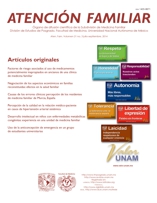Negotiation of Economic Aspects in Reconstituted Families: Family Health Effects
Main Article Content
Abstract
Objective: describe the negotiation on economic aspects of reconstituted couples. Material and methods: qualitative and interpretative study. Under the assumption that remarried couples are more vulnerable for failure, as they take for granted the roles of gender and of each partner, which hinders communication, negotiation and agreements in the family. The following hypothesis was raised: “the lack of negotiation and agreements on the role of spouses in the reconstituted couple influences family breakdown”. The selection criteria were: remarried couples, patients of the issste (Institute of Security and Social Services for the State Workers) “Gustavo A Madero” Family Medicine Clinic (fmc), in Mexico City. The sampling was to convenience, three couples, that means, six spouses of reconstituted families were included. It was used, as an instrument, an interview guide considering five dimensions of the study: negotiation of economic arrangements, child care, work home, communication in the couple and sexuality. Semi-structured audio-taped interviews were conducted under informed consent. Results: in couples 1 and 2 there was no dialogue and proper negotiation about family economy, which caused difficulty and tension between spouses, in addition, the distribution of economic resources was based on the needs. In couple 3, dialogue and economic cooperation were more equitable and based on the planning and organization of the primary and secondary needs, favoring the integration and a more stable family dynamics. Conclusions: difficulty in communication and the implicit functions of the gender role, do not allow negotiation, planning or organization of the family, which is a risk factor for the integration and family health.
Downloads
Download data is not yet available.
Article Details
How to Cite
Herrera-Gómez, F., & Hamui-Sutton, A. (2015). Negotiation of Economic Aspects in Reconstituted Families: Family Health Effects. Atención Familiar, 21(3). https://doi.org/10.22201/facmed.14058871p.2014.3.47941
